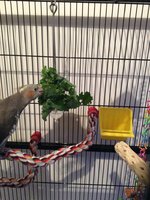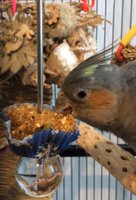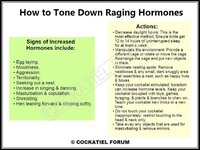Raptor40
Meeting neighbors
Hey!
I've had 2 clutches of chicks now (5 eggs in each, all hatching with 2 chicks surviving the first clutch and 3 the second). I had taken the first 2 chicks out for hand raising, waited a bit and then taken the main nesting box out. By this time, however, they'd already started mating and I put the main nesting box back in as I was concerned the female would become egg-bound if I didn't (not sure how it all works on that front). I know now that I also should've taken the second nesting box out, too.
However, this time 2 chicks are only about 2 weeks old and still outside in the nesting box with the parents (other one inside as he is tiny and stunted) and they are yet again starting to mate. I'm not really sure what to do here, as the hen has already had 2 clutches over the last 4 months and I know that compulsive egg-laying is not healthy for the hen. I will be taking the chicks out in a few days to a week for hand-rearing, meaning I'll be taking the nesting box out then, but I don't feel it's natural for the parents to want to move on so quickly to laying again while they still have 2 young chicks. I absolutely love rearing cockatiels, but I'm not sure having constant chicks is a good thing for anyone.
The chicks themselves haven't had the best survival rate (less than half surviving) and the chicks I have in early due to small size have all seemed to have some sort of neurological problems. One had crop-emptying issues, which I'd spent about $1000 on vet bills for only to find he had a neurological issue that prevented digestion. Another one passed away last night after weird illness symptoms such as lack of growth, only weighing about 8 grams at 8 days, refusing food, a hardened crop, air in the crop, waving the head side-to-side all the time and constantly lying on its back. I'm 100% sure this chick didn't have issues due to my care as I'd weighed him, constantly checked the crop, checked the formula consistency and temp, and made sure his brooder was the warm. The crop was also doughy when I brought him in, so not sure if it was something he might've been born with. I'm a little concerned that these problems might be due to excessive laying.
Is there anybody else who's had these problems?
I've had 2 clutches of chicks now (5 eggs in each, all hatching with 2 chicks surviving the first clutch and 3 the second). I had taken the first 2 chicks out for hand raising, waited a bit and then taken the main nesting box out. By this time, however, they'd already started mating and I put the main nesting box back in as I was concerned the female would become egg-bound if I didn't (not sure how it all works on that front). I know now that I also should've taken the second nesting box out, too.
However, this time 2 chicks are only about 2 weeks old and still outside in the nesting box with the parents (other one inside as he is tiny and stunted) and they are yet again starting to mate. I'm not really sure what to do here, as the hen has already had 2 clutches over the last 4 months and I know that compulsive egg-laying is not healthy for the hen. I will be taking the chicks out in a few days to a week for hand-rearing, meaning I'll be taking the nesting box out then, but I don't feel it's natural for the parents to want to move on so quickly to laying again while they still have 2 young chicks. I absolutely love rearing cockatiels, but I'm not sure having constant chicks is a good thing for anyone.
The chicks themselves haven't had the best survival rate (less than half surviving) and the chicks I have in early due to small size have all seemed to have some sort of neurological problems. One had crop-emptying issues, which I'd spent about $1000 on vet bills for only to find he had a neurological issue that prevented digestion. Another one passed away last night after weird illness symptoms such as lack of growth, only weighing about 8 grams at 8 days, refusing food, a hardened crop, air in the crop, waving the head side-to-side all the time and constantly lying on its back. I'm 100% sure this chick didn't have issues due to my care as I'd weighed him, constantly checked the crop, checked the formula consistency and temp, and made sure his brooder was the warm. The crop was also doughy when I brought him in, so not sure if it was something he might've been born with. I'm a little concerned that these problems might be due to excessive laying.
Is there anybody else who's had these problems?




